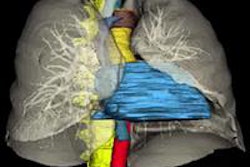Radiation oncologists would welcome more formal recommendations and guidance to improve the peer-review process, according to a study published in the January-February issue of Practical Radiation Oncology.
The American Society for Radiation Oncology (ASTRO) conducted the survey in 2013, distributing it to nearly 6,000 members worldwide. Of the 572 respondents, 423 (74%) said they were interested in formal guidelines and recommendations from ASTRO to help the peer-review process.
When asked if and how peer review changed patient case management, 498 individuals (87%) said they changed fractionation, 469 (82%) adjusted dose, 400 (70%) altered contouring, and 280 (49%) changed the treatment intent (Pract Radiat Oncol, Vol. 5:1, pp. 32-38).
Overall, 7% to 10% of patient cases were changed due to peer review, according to lead author Dr. David Hoopes and colleagues.
Other results were as follows:
- 83% of respondents performed peer review during the first week of radiation therapy treatment.
- 65% were involved in peer review prior to the beginning of treatment.
- 83% reported being involved in peer review.
- 75% were comfortable with their practice's current peer-review program.
- 11% reported being uncomfortable with their program.
- 6% said their working environment did not encourage peer review.



















